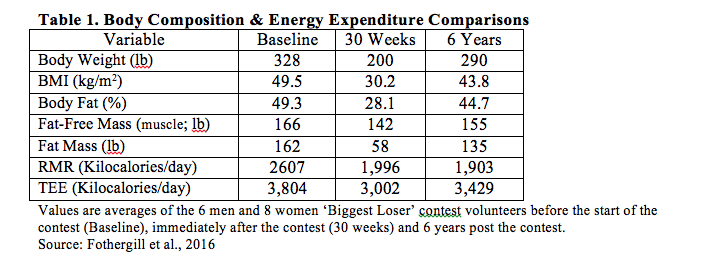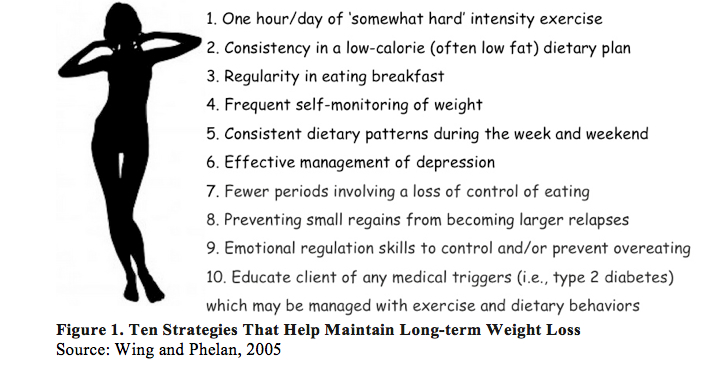| Dieting Makes You Fat! How? Len Kravitz, Ph.D. Introduction No doubt many IFJ readers have recently read or heard, from some popular media services, of a study summarizing weight regain results from several 2009 'The Biggest Loser' TV show contestants. Yes, indeed, a 2016 publication (Fothergill et al) in the journal Obesity indicates that of the 14 contestants (6 men and 8 women) followed for six years after the contest, the majority of them have regained a substantial amount of weight. The new research offers scientific explanations, why, which are discussed in this research column.. Resting Metabolic Rate Changes with Weight Loss The total energy expenditure (TEE) produced by life-sustaining metabolic processes consists of three main categories; resting energy expenditure (REE; also referred to as resting metabolic rate [RMR], which is the energy needed for the maintenance of cellular homeostasis), the thermic effect of food (i.e., the energy [~10% of TEE] required for the digestion, absorption, transport, metabolism and storage of all the foods eaten), and physical activity-induced energy expenditure (i.e., exercise and spontaneous movement) (Wang et al., 2000). Wang et al. continue that REE, measured at rest after an overnight fast, is the largest portion of the body's energy expenditure, comprising 60-75% of the body's TEE. Uniquely, Fothergill et al. (2016) explain that with weight loss there is a slowing of the body's resting metabolic rate (RMR). In science, this is referred to as 'metabolic adaptation' or 'adaptive thermogenesis.' Fothergill et al. elaborate that 'metabolic adaptation' is actually a phenomenon of the body to counteract the weight loss. It slows the metabolic rate so it is easier for the body to gain back the weight loss. With the 2009 biggest loser contestants (who volunteerd for this study), Fothergill et al. measured several physioogical parameters and RMR (determined by indirect calorimetry) at baseline, at the end of the 30-week competition, and 6 years post the 'Biggest Loser' competition (see Table 1 for some of these assessments). |
||||||||
 |
||||||||
| On average, the 14 contestants each lost 128 lbs in the 30-week exercise and nutrition competition. At the 6-year follow-up, the contestants gained back an average of 90 lbs. The contestants lost 24 lbs of muscle despite the vigorous 30-week exercise program, but gained back 13 lbs of muscle by the 6-yr follow-up. Comparatively, the contestants lost an average of 104 lbs of fat in 30 weeks, but gained back 77 lbs of fat at the 6-year assessment. Perhaps the most startling result that helps to explain the weight REGAIN is seen with the RMR measurements. At the completion of the 30-week exercise and nutrition contest, the measured RMR was 611 kilocalories lower than baseline. Surprisingly, at the 6-year follow-up RMR was on average 93 kilocalories lower than after the 30-week exercise/nutrition intervention. From baseline to 6-yr follow-up, RMR was suppressed an average of 704 kilocalories. It should be noted that the researchers observed some hormonal and biomarker changes (of appetite) that occurred following the contest, but their research was not statistically powerful enough to make any conclusive statements. However, Sumithran et al. (2011), with a study of over 50 obese participants, revealed that one year of intentional weight loss (striving for 10% loss of body weight) several markers of appetite, hunger and fat deposition (e.g., leptin, peptide YY, cholecystokinin, insulin, ghrelin, gastric inhibitory polypeptide and pancreatic polypeptide) were significantly different from baseline, all promoting weight gain. In an upcoming research column we will explore these biomarkers thoroughly. The future of successful weight management for many people will eventually require the development of safe, effective, long-term treatments to counteract these metabolic compensatory mechanisms (Sumithran). Did the Rapid Weight Loss of the Contestants Influence their Weight Regain? Many professionals may hypothesize that the rapid loss experienced by “The Biggest Loser” participants contributed to their subsequent weight regain. However, Fothergill et al. (2016) cite recent studies, which do not support the construct that RATE of weight loss affects long-term weight regain. What Other Factors affect the 'Diets make you fat' Phenomenon? Pietilainen et al. (2012) collected and reported weight changes (taken by surveys) of 4129 individual twins from the population-based FinnTwin16 Finnish study at years 16, 17, 18 and 25 years past baseline. The researchers confirm that dieting, which is referred to in research as an 'intentional weight loss' intervention may lead to the opposite of the desired outcome. The authors hypothesize that restrictive dieting may lead some people to become pre-occupied with food and trigger overeating. In addition, they add that the suppression of metabolic rate and loss of lean mass (noted in 'The Biggest Loser' contestants) may facilitate post-dieting weight-rebound. These 'defensive' reactions (psychological and/or physiological) to dieting clearly contribute to restoring any weight lost through dieting and could in theory persist beyond the point of weight restoration (i.e., leading to more weight gain). Pietilainen et al. (2012) conclude that genetics also plays a substantial role in weight regain for some people. What Directions Should Exercise Professionals Follow to Help Clients Prevent Weight Regain? As seen with 'The Biggest Loser' show and other study results, we do know how to develop successful intentional weight loss programs, which combine exercise, nutrition and behavior modification. For weight REGAIN management, we have less data. However, the results from the National Weight Control Registry members, who have lost an average of 73 lbs and maintained a significant loss for more than 5 years offers several key strategies (Wing and Phelan, 2005). Interestingly, approximately one-half of registry members report having been overweight as a child, and almost 75% have one or two parents who are obese, concurring the data from Pietilainen et al. (2012) of a consequential genetic component to weight gain. The National Registry database of people confirms that long-term weight loss maintenance is achievable. Wing and Phelan suggest that initially, as professionals, we need to define successful weight loss, which they suggest is individuals who have intentionally lost 10% of their body weight and kept it off for at least one year. The authors explain the 10% criterion is suggested because weight losses of this amount can elicit meaningful improvements in risk factors for heart disease and type 2 diabetes. The authors cite data from the Institute of Medicine designating weight maintenance for one year as a successful duration of weight loss. From their evaluation of their research combined with other studies, Wing and Phelan estimate that about 20% of overweight individuals attain successful weight loss criteria. Additionally, Wing and Phelan emphasize, from their research, people who have maintained weight loss for up to 2-5 years show even greater chances for longer-term success. The authors state that most successful weight loss maintenance involves high levels of physical activity, representing about 1 hour/day of moderate-intensity (i.e., somewhat hard) activity, such as brisk walking. This is equivalent to an average of 2545 kcal/week in physical activity for women, with men having an average of 3293 kcal/week (Wing and Pheland). A complete review of the most common behaviors of people who have lost at least 10% (and often much more) of their body weight and prevented weight regain is seen in Figure 1. With strategic planning and client education, exercises professionals can help determined clients prioritize the workable steps to achieve and maintain meaningful amounts of weight loss. It may be challenging, but it is definitely doable! |
||||||||
 |
||||||||
| References: Fothergill, E., Guo, J, Howard, L. et al. (2016). Persistent Metabolic Adaptation 6 Years After “The Biggest Loser” Competition, Obesity, doi:10.1002/oby.21538 Pietilainen, K.H. SE Saarni, S.E., and Kaprio, J. et al. (2012). Does dieting make you fat? A twin study, International Journal of Obesity, 36, 456-464; doi:10.1038/ijo.2011.160 Wang, Z., Heshka, S., Gallagher, D. et al. (2000). Resting energy expenditure-fat-free mass relationship: new insights provided by body composition modeling. American Journal of Physiology. Endocrinology and Metabolism, 279, E539-E545. Sumithran, P., Pendegast, L.A., Delbridge, E. et al. (2011). Long-Term Persistence of Hormonal Adaptations to Weight Loss, New England Journal of Medicine, New England Journal of Medicine, 365,1597-604. Wing, R.R. and Phelan, S. (2005). Long-term weight loss maintenance. American Journal of Clinical Nutrition, 82(suppl), 222S-225S. |
||||||||
|
|
||||||||
|